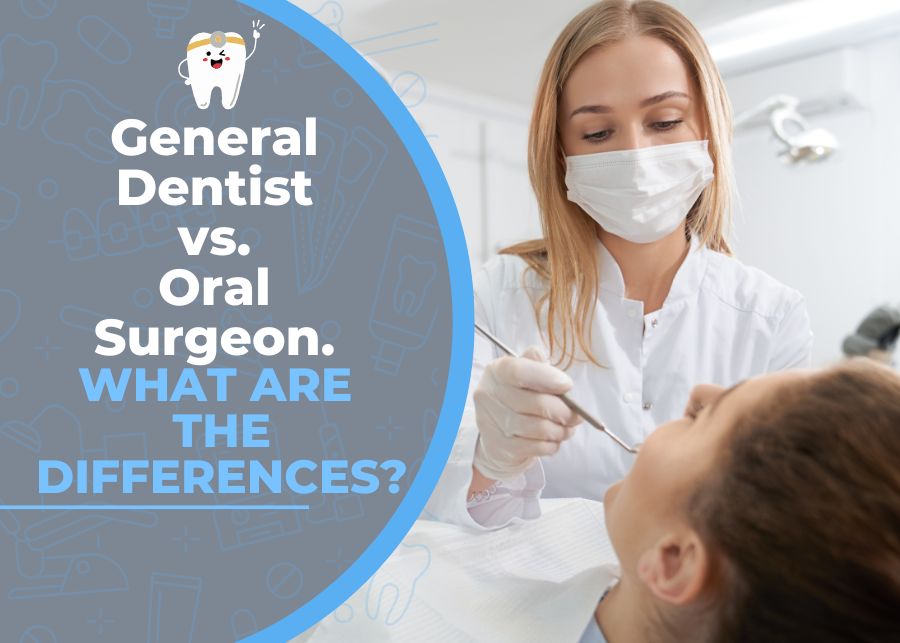Confused about whether you should choose a general dentist or an oral surgeon?
Dentistry encompasses a wide range of specialties, and each specific dental condition needs the expertise of a particular type of professional.
Although they are in the same field of medicine, there’s a wide difference between a general dentist and an oral surgeon. Not only because of the different procedures and issues each one treats but also because of the training and expertise involved.
Here’s everything you need to know about the differences between a general dentist and an oral surgeon and what you should take into consideration when scheduling an appointment:

What Does a General Dentist Do?
General dentists provide primary dental care to patients of all ages and administer routine procedures for preventive and restorative oral healthcare. They commonly offer family dental services, specialized treatments, and regular cleanings, and maintain a comprehensive record of their patient’s overall oral health.
A general dentist performs procedures focused on repairing damage caused by disease, trauma, or tooth decay, such as fillings, root canals, and crowns.
Oral surgeons are dental specialists who undergo an additional four to six years of education compared to general dentists. They specialize in addressing issues pertaining to the soft and hard tissues of the mouth, jaw, and face. Additionally, they have expertise in areas such as otolaryngology (ear, nose, and throat), anesthesiology, internal medicine, plastic surgery, and emergency medicine.
Their extensive knowledge and experience make them highly skilled in diagnosing and treating various conditions involving facial bones, including the jaw.


Main Difference:
In summary, there’s one main difference between these two specializations that changes everything: education.
Oral surgeons receive extensive education to become surgical specialists. The oral surgeon is the most qualified to perform complex dental implant procedures when compared to a periodontist and a general dentist, thanks to their rigorous training. This training consists of an additional four to six years of training after completing dental school. Then, they need a board certification, which is granted after demonstrating proficiency in surgical cases and passing many oral and written exams. Being board certified signifies a sense of confidence and competence. A surgeon can also be board-eligible, which means that they’re currently in the process of becoming certified. On the other hand, general dentists can be certified after a weekend course.
When choosing a professional to undergo dental treatment, experience is key. That’s why a track record of satisfied patients is the ultimate testament to quality. While board certification demonstrates a successful track record, conducting research to obtain genuine feedback from previous patients is an excellent method to ensure you will receive excellent care. In many instances, you can request to speak with a former patient for further reassurance.
If the patient needs teeth extracted before their procedure, only an oral surgeon is licensed to have general anesthesia administered in their office. This is both a wise and comfortable option for the patient.
It’s important to get to know all of the people who will be involved in your procedure.
Here are some recommended questions that might be useful for you during your first appointment:
Are you an oral surgeon or a dentist?
Are you a board-certified oral surgeon?
How long have you been performing this procedure?
Could you connect me with a recent patient who can provide further information and answer additional questions about the procedure?

Despite being part of the same profession, general dentists and oral surgeons have distinct roles and responsibilities. The decision to choose one over the other depends on the specific treatment required. For routine checkups or regular cleanings, it is advisable to visit a dentist. However, if you need complex procedures, it is recommended that you schedule an appointment with an oral surgeon.
If you are experiencing oral health problems, it is important not to hesitate to seek assistance from a general dentist. They can guide you and, if necessary, refer you to an oral surgeon for more advanced procedures.

